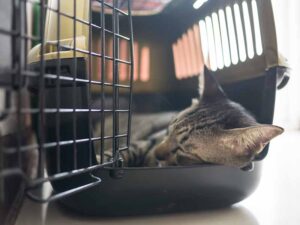Índice do Conteúdo
When cats hide, they aren’t simply waiting for you to seek them out. Instead, cats sniff out quiet, dark, seemingly inaccessible places so they can go it alone – especially if they are in ill health. But why do they do this? How can cat owners help? Paying extra close attention to the subtle art of feline behavior is a good place to start.
February is National Cat Health Month; and while we focus on cat health every day, we wanted to take advantage of the spotlight to showcase this often-misunderstood feline behavior.
The Cat Barometer
While cats are often perceived as aloof or elusive, they are actually speaking volumes with their unique feline behavior traits. If your cat is hiding or isolating himself from you and your family, consider the following:
Take note of their appearance – Are their eyes clear and alert? What is the condition of the coat and skin? Are they under or over grooming themselves? Does their breath smell? Do you notice any lumps or bumps? Are they hunched over while sitting down or showing irritability when they cannot get comfortable? Observe them when they eat and use their litter box – If they try to pick up their food but drop it, they may have a dental problem. Are they drinking and urinating more than before (indicating possible serious health concerns like diabetes)? Also, going to the bathroom outside the litter box can be indicative of larger concern, such as painful arthritis.Energy levels – Is your cat sleeping more often? Are they showing a lack of interest in things that previously excited them, like treats or toys? Do they appear restless or uncharacteristically aggressive? Cats that are atypically clingy or excessively vocal may need help, too.
Grasping Feline Behavior
Anytime you notice departures from the usual, we recommend contacting us. It might not be clear at home whether your cat is sick or injured, but with an exam, advanced diagnostics, and a discussion on their medical history and lifestyle, we can figure out what the underlying cause is.
We can effectively plot a course for symptom management and treatment. This may include medication, change in diet, and even physical rehabilitation.
Changes at Home
You may notice additional changes in feline behavior at home afterwards. Extra considerations regarding placement of their food/water bowls, litter box, and bed are critical to their comfort.
Likewise, it may be time to manage their exposure to other people and pets in the house. Talk to kids about giving your cat a larger space bubble and be sure they have a place of refuge.
Supporting Feline Behavior
Truly the best way to deal with feline illness or injury is to maintain their schedule of routine wellness exams. Preventive medicine is ideal. As a cat owner, you can support your feline’s happiness and well-being by:
Scheduling a yearly or bi-annual wellness examStaying up to date with feline vaccinationsMaintaining regular dental care
Remember, early detection is the key to a long and healthy life!
Helping your cat live their best possible life is a huge priority for us at Cat Care of Vinings. Please reach out to us with any questions or concerns.







